Aquatic Invertebrates
Media

Species Types
Scientific Name
Species in the beetle family Gyrinidae
Description
Groups of whirligig beetles swim on the water surface in quick, random patterns, searching for food. They have two pairs of eyes — one pair above water, one pair below — to help them quickly and accurately capture their prey.
Media
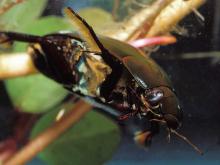
Species Types
Scientific Name
Species in the beetle family Dytiscidae
Description
Like many aquatic insects, these large oval beetles prey voraciously on other aquatic organisms. Excellent swimmers, they fly well, too, and are often attracted to lights.
Media
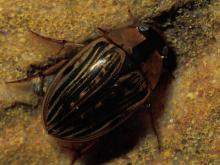
Species Types
Scientific Name
Beetles in the family Hydrophilidae
Description
Water scavenger beetles are a mostly aquatic family. They are similar to predaceous diving beetles, but unlike them many have a distinctive spine running down the center of their bellies.
Media

Species Types
Scientific Name
Species in the genera Abedus, Belostoma, and Lethocerus
Description
Giant water bugs are huge aquatic insects that frequently fly around electric lights at night. They are infamous for the painful bite they can deliver, but fish, birds — and some people — find them tasty!
Media

Species Types
Scientific Name
About 125 species in North America in the family Corixidae
Description
Water boatmen are one of the few aquatic true bugs that are not predatory and do not bite people. Instead, they suck juices from algae and detritus. Only a few types eat other small aquatic creatures.
Media
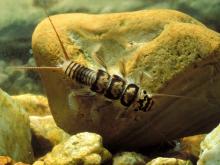
Species Types
Scientific Name
There are hundreds of species in North America
Description
Stonefly larvae are aquatic and somewhat resemble the larvae of mayflies and damselflies. Their presence usually indicates good water quality.
Media

Species Types
Scientific Name
About 1,500 species in North America north of Mexico
Description
The aquatic larvae of caddisflies are famous for building portable, protective cases out of local materials, including grains of sand, bits of leaves and twigs, and other debris. The adults are mothlike.
Media

Species Types
Scientific Name
Corydalus cornutus
Description
Hellgrammites are the aquatic larval form of eastern dobsonflies. They are fiercely predaceous and look a little like centipedes. Anglers often use them as bait.
Media
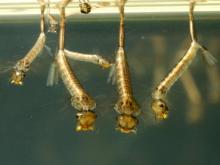
Species Types
Scientific Name
There are about 50 species of mosquitoes in our state.
Description
The larvae of mosquitoes, often called “wrigglers,” have a large head and thorax and a narrow, wormlike abdomen; they typically hang just below the water surface. When disturbed, they wriggle downward.
Media
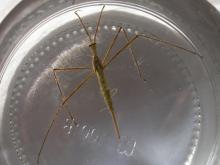
Species Types
Scientific Name
Ranatra spp. and Nepa apiculata
Description
Water scorpions remain still, looking like a random bit of plant material. Then they suddenly grab their prey and deliver disabling fluids with a quick jab of their knifelike beak.
See Also
About Aquatic Invertebrates in Missouri
Missouri's streams, lakes, and other aquatic habitats hold thousands of kinds of invertebrates — worms, freshwater mussels, snails, crayfish, insects, and other animals without backbones. These creatures are vital links in the aquatic food chain, and their presence and numbers tell us a lot about water quality.





















